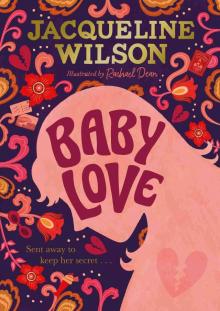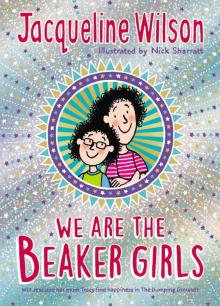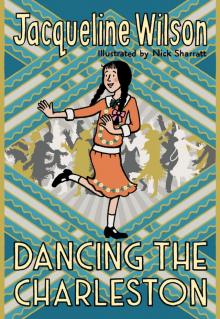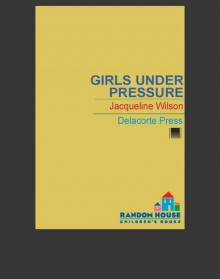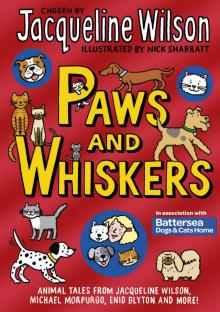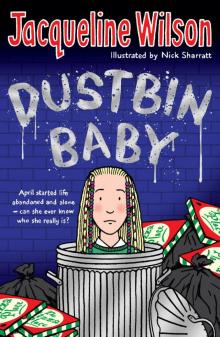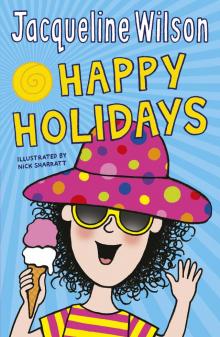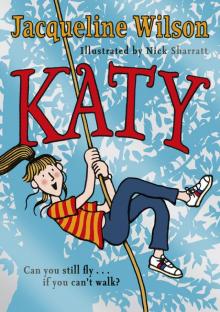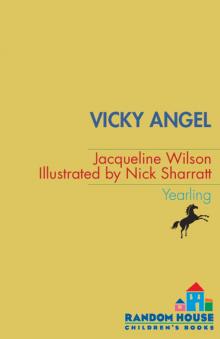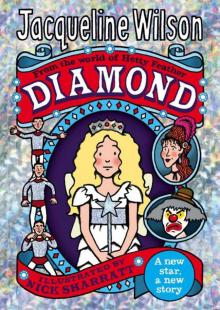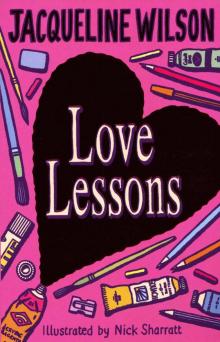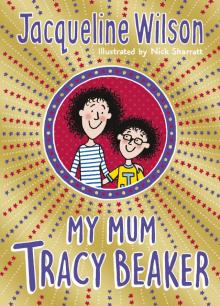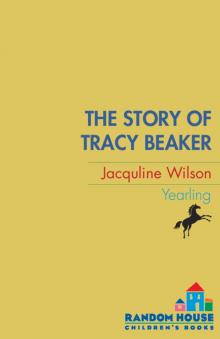Baby Love, page 1





This book is set in 1960 and contains sensitive content that reflects the attitudes of the time. It includes scenes of a sexual nature that are not suitable for younger readers. For more information please see the notes at the end of the book.
Contents
Chapter 1
Chapter 2
Chapter 3
Chapter 4
Chapter 5
Chapter 6
Chapter 7
Chapter 8
Chapter 9
Chapter 10
Chapter 11
Chapter 12
Chapter 13
Chapter 14
Chapter 15
Chapter 16
Chapter 17
Chapter 18
Chapter 19
Chapter 20
Chapter 21
Chapter 22
Afterword
A Note on Adoption
A Note on Sexual Consent
About the Author
Jacqueline Wilson wrote her first novel when she was nine years old, and she has been writing ever since. She is now one of Britain’s bestselling and most beloved children’s authors. She has written over 100 books and is the creator of characters such as Tracy Beaker and Hetty Feather. More than forty million copies of her books have been sold.
As well as winning many awards for her books, including the Children’s Book of the Year, Jacqueline is a former Children’s Laureate, and in 2008 she was appointed a Dame.
Jacqueline is also a great reader, and has amassed over 20,000 books, along with her famous collection of silver rings.
For Kelly, with many thanks
1960
I was in all the newspapers when I was fourteen. I wasn’t named, but Mum and Dad could never forgive me. I’ve still got the clippings, though I can’t bear to read them.
1960 seems so long ago, like another world altogether. People talk about the Swinging Sixties, all the mad fashion and great pop music, but it wasn’t like that then, not for ordinary girls like me anyway.
The Beatles formed a band that year, but no one had heard of them yet. It was all Elvis and Cliff. I couldn’t listen to either because we didn’t have a record player. My parents were saving up for a radiogram, though a washing machine was first on their wish list. It was going to take them a very long time before they had enough to buy either. They didn’t believe in hire purchase.
We did have a television. Mum never missed a panel game called What’s My Line? She was in awe of the panellists because they always wore evening dress and had posh accents. They were the Upper Crust. I suppose we were the Soggy Bottoms.
We couldn’t afford a proper house so we lived in a prefab with a corrugated iron roof, but my mum kept it pin neat and my dad clipped our privet hedge every week, sometimes twice. We were considered posh down our road.
Then I ruined everything. I wasn’t ordinary any more. I was notorious.
1959
I had an older sister and an older brother, but they both died shortly after they were born so I grew up as an only child. I didn’t know about them while I was growing up. Mum and Dad never once mentioned them. I sometimes said I wished I had a little sister or brother to play with. They just shook their heads at me and said being an only child was much more special. I never dreamt I’d had two potential siblings.
I only found out last summer. Mum had just started her job at Wallis the dress shop, and Dad was busy driving day-trippers to Brighton and Eastbourne and Worthing, so I was left to amuse myself during the holidays.
I didn’t mind in the slightest being home by myself. I read a great deal and wrote some very bad poetry. If I felt lonely I chatted to Miss Wong, a very glamorous Chinese girl in a painting hanging on our wall. Mum felt it was posh to have pictures on the wall and Dad said Miss Wong was a real good-looker.
One day I decided to have a good ferret through the Cubby Hole. As we lived in a prefab we didn’t have an attic, but we had a very big walk-in cupboard where Mum stored old things.
There was a trunk full of her clothes, including her wedding dress. I tried it on though it wasn’t very pretty and the white silk had yellowed. It wasn’t proper silk, because you couldn’t buy that during the war when she got married. Apparently my grandma had made it out of parachute silk.
I took the dress off, tried on an uninspiring purple evening dress instead, and wound a drooping fox tippet round my neck, but the bad-tempered little animal face unnerved me, and I thrust all the clothes back in the trunk.
There was a big box right at the back that had once held a dozen Christmas crackers. That surprised me, because we never bothered having crackers with our festive roast chicken as there were just the three of us. Perhaps my parents were more sociable in the past. I lifted the lid and then stared in surprise. There were knitted baby clothes: two sets of matinee jackets and bonnets and booties with tiny satin ribbons, one in pale pink, the other powder blue. They both looked brand new. There were more baby things too – a little china mug with rabbits, a tiny teddy bear, a bottle with a rubber teat, a tin of Johnson’s baby powder, even a jar of zinc cream to prevent nappy rash. I opened it and saw the cream had never been used.
I thought they must be my baby things, but I couldn’t work out why they’d been kept untouched in the cracker box. I put everything back carefully apart from the pale pink bootees. I still had my big baby doll Rosebud, though of course I didn’t play with her now. She had a full set of her own clothes but her feet were bare. The pink bootees fitted her perfectly.
I forgot all about exploring the Cubby Hole until Monday, Mum’s day off when she did her weekly spring clean. She took my doll and my Whimsie china ornaments off the windowsill to give them a good dusting and discovered Rosebud’s new shoes.
‘Where did you get these bootees, Laura?’ she demanded, holding Rosebud upside down and brandishing her newly shod feet at me.
My heart started thudding. I knew I wasn’t really allowed to go rooting through the Cubby Hole.
‘Oh, I just found them,’ I said vaguely.
‘I know where too! You found them in the cracker box, didn’t you!’ Mum said. She was actually shaking.
I shook my head and pointlessly denied it.
‘Yes you did! You found them in the cracker box!’ Mum said, her voice rising.
There was a programme on children’s television called Crackerjack. I thought it very silly, especially when the audience had to shout out ‘Crackerjack!’ when someone won a prize. Mum sounded as if she was taking part in the show so I couldn’t help grinning, and Mum slapped my face.
It was the first time she’d hit me and I burst into tears of shock. Mum did too. She sat on the end of my bed, sobbing, clutching Rosebud to her chest.
‘Mum? Mum, don’t cry,’ I said. ‘I’m sorry. I didn’t mean to upset you so.’
‘I know,’ said Mum, struggling to gain control of herself. She rubbed her eyes and blinked at my face. ‘Oh dear, your cheek’s gone all red. I didn’t really hurt you, did I? But you shouldn’t have gone poking in that cracker box. It’s private.’
‘Are they my baby things?’ I asked.
‘No. If you must know I knitted these little booties for your sister when she was newly born,’ Mum said in a rush. ‘But she’d come too soon. She passed before I could even bring her home from hospital, poor little soul,’ Mum said, tears trickling down her face.
I wasn’t entirely certain what Mum meant. The word passed confused me. I imagined maternity nurses passing this tiny stranger sister all around the ward as if they were playing pass the parcel.
‘It took me a long time to get over the shock. But then I started expecting again, and I went full-term with your brother. He was a big bonnie baby, eight pounds four ounces, but there was something wrong with his insides. He had an operation but it didn’t work. I never got a chance to dress him in his little blue outfit and take him home either. My boy!’ Mum rocked backwards and forwards on the bed, weeping for him too.
I felt so sorry for her, but very embarrassed by her outburst.
‘What was he called?’ I asked, simply for something to say.
‘William, after your dad,’ said Mum. ‘Though we planned to call him Billy to save confusion.’ Her voice broke.
‘Baby Billy,’ I said, trying to imagine having a big brother. And a big sister too. We might have been a very different family then.
‘What was my sister called?’
‘Laura,’ said Mum.
This was a shock. Laura was my name.
‘Laura?’ I repeated.
‘Well, I’ve always liked the name,’ Mum said defensively.
‘Did you dress me in the pink booties and the little woollen coat and bonnet?’ I asked.
‘No!’ Mum sounded shocked. ‘They were knitted for her.’
‘So what colour outfit did you make for me?’
‘I didn’t. I thought it would be bad luck. I didn’t get anything prepared. I was stuck when it was time to take you home from the hospital. Your father wasn’t demobbed yet, so I had to give a neighbour some money to go shopping for baby clothes. She bought you a white set of woollies from Woolworths,’ said Mum.
‘Woollies from Woolworths,’ I said. It sounded comical – and strange. I loved Woolworths and had grown up spending my pocket money there, treating myself to two ounces of lemonade powder in a tiny paper bag and a little pink rubber doll the size of my thumb. But Mum always looked down on Woolworths, especially their clothes.
‘I chose all your other baby clothes from Bentalls
‘I’ve seen the chicken dress,’ I said. It was in the photograph album.
I went to the bureau in the living room and found it. It was near the front, after Mum and Dad’s wedding photo, with my Aunt Susannah a very glamorous bridesmaid. I was sitting on Mum’s lap, and looked rather like a chick myself, with my fair hair in a little quiff. Mum rather spoiled that photo though, because she was frowning, her lips tightly pressed together.
‘Why do you look so miserable?’ I asked.
‘Oh, I daresay you’d been playing up,’ said Mum.
‘Was I a naughty baby then?’ I asked, surprised. I always tried to be very good now – or did my best not to be found out if I did something bad.
Mum sighed. ‘No, you were actually quite a dear little thing, but I was so anxious, you see. I thought I was jinxed and that I’d lose all my babies. I kept waiting for something bad to happen to you.’
I remembered my first day at school. Lots of the new Infants were crying, but I didn’t. Mum was the one in tears, forever telling me to listen to the teacher and avoid all the rough children in the playground and steer clear of the Jungle Gym because I’d fall off and bang my head.
Mum was still looking at me.
‘Nothing bad is going to happen now,’ I said. ‘I’m practically grown up.’
‘Don’t tempt fate!’ said Mum.
She fussed anxiously every time I got a cold, and she took a whole week off work at Easter this year when I had flu. It was high fever can’t-get-out-of-bed flu, so Mum phoned Dr Bertram, our family doctor. He listened to my chest and said I might have a touch of pneumonia. Mum panicked then and kept me in bed long after I was better. She didn’t even let me go back to school when the new term started.
‘We need to build you up a bit first,’ she said. She gave me liver or mince or steamed plaice, all of which I hated. It was a relief when I went back to school, even though the school dinners were awful too – fatty stew and lumpy mashed potatoes and soggy cabbage. I’d missed a fortnight’s lessons and had fallen behind, so our form teacher Miss Wiltshire suggested I take someone else’s workbooks home for several days to copy from them.
‘Ask Nina Bertram if you can borrow her books, dear,’ she said.
Nina Bertram was very much a teacher’s pet. She was generally very popular, though a few girls hated her, but that was probably because they were jealous. She wasn’t exactly pretty. Her face was a bit too long, and her skin was sallow, but she had long glossy black hair past her shoulders and startling blue eyes. She looked as if she could see inside you and read your thoughts.
She spoke in a posh voice, but when there were no teachers around she could tell the filthiest stories. I was on her dinner table and couldn’t believe some of the tales she told. All the other girls shrieked with laughter and got into trouble with the dinner ladies, while Nina sat there demurely, everyone’s favourite. She had a mottled green Parker pen, and a real gold St Christopher necklace (it was the only jewellery we were allowed to wear at school, apart from a wristwatch). Nina’s watch was Swiss and was rumoured to have cost a fortune.
Nina lived in one of the big houses on Riverside Drive. Her father was a doctor (the one who had listened to my chest) and her mother was a doctor too, though she worked in a skin clinic. They were both called Dr Bertram, which sounded funny.
All the teachers at our school expected Nina to go into medicine too because she was so good at all the sciences, but she said she thought that idea boring. Nina wanted to be an actress. We were both in the Drama club at school, and had parts in Romeo and Juliet. Ours was a girls’ school, but boys from their grammar down the road were invited to take part. Max Russell, the boy playing Romeo, was a sixth former, tall and sporty and handsome. Practically every girl in our school had a crush on him. Inevitably, Nina was chosen to play Juliet.
She was so good that the local paper wrote a whole column about her because they were so impressed. Nina made you believe she really was Juliet. I watched her cry real tears at rehearsals but then moments later she’d be larking around with Max Russell and the other boys.
I didn’t have a proper part. I was just Female Courtier. I learned the whole of Juliet’s lines. I wasn’t the understudy, I just wanted to play Juliet in private. I acted it out scene by scene in the bathroom, watching myself in the mirror. I tried so hard but I knew I wasn’t a patch on Nina.
I couldn’t help being in awe of her. We were in the same class, we went to the same Drama club, we ate at the same table every day – and yet we’d barely spoken all that time. It took me all day to pluck up courage to talk to her. I waited till the bell rang for the end of lessons, and then sidled up to her as she was packing her bag. It was a regulation school satchel, but inevitably superior – made of conker-brown shiny leather and lined with tartan.
‘Nina?’ I said tentatively.
She looked up, tossing her hair out of her face. She raised one arched eyebrow.
‘Sorry to bother you, but Miss Wiltshire wants me to borrow your workbooks so I can catch up on all the lessons I missed,’ I said.
‘Oh, what a bore,’ she said.
I didn’t know if she meant it was a bore for her or a bore for me. I just stood there, feeling a fool.
‘OK, OK,’ she said, thrusting her science and biology workbooks at me. ‘Here, have these for a start. Can you read my handwriting?’
It was a silly question. She used black ink, not blue like the rest of us, and her Parker pen helped her write in a clear round script, without a single blotch or crossing-out.
‘No, it’s so messy. Can’t read a word,’ I said.
She blinked at me in surprise, taking me seriously for a second. Then she laughed, looking at me with more interest. ‘Well, you’d better put your new specs on,’ she said.
I’d started to get headaches last year. Mum panicked and took me to the doctor – Nina’s father again – and he said it was probably just my age, but I should have my eyes tested by an optician all the same. Mum made another appointment and the optician said I was a little short-sighted and prescribed glasses. She didn’t want me to wear the pink National Health sort – she paid for proper grown-up spectacles with upswept frames. I absolutely hated them. I’d worn them at school for several days but saw some of the girls nudging each other and sniggering. I only wore them at home now when Mum was around. I didn’t think Nina had even noticed I had glasses.
‘No, I’ll manage without,’ I said.
‘They don’t look too bad,’ Nina said surprisingly. ‘Actually, I’m supposed to wear glasses too, and mine look awful. Catch me wearing them at school!’
I was amazed. I wondered if any of Nina’s friends knew she had glasses. She was treating me as if I was a friend.
I borrowed her workbooks for a week, copying and making notes. I got a bit lost looking at her maths because she hadn’t put all her working-out down on the page. I suppose I should have asked Mrs Henshaw, the maths teacher, to explain, but I asked Nina instead.
‘Oh yeah, this new stuff is such a bore. I got my brother Daniel to explain it and I sort of understood, but it was quicker just to get him to give me the answers. Look, tell you what, come round to mine for tea tonight and we’ll work them out together,’ she said casually.
‘Yeah, fine,’ I said, matching her tone – but my heart was thumping. Would I be back in time for Mum coming home from Wallis Modes? She’d go bananas if I wasn’t there and think I’d been run over or kidnapped. But it couldn’t be helped. Nina Bertram was asking me to tea!
It was a wonderful tea. I thought it might be a cup of tea with a Penguin biscuit, but it was a fantastic spread: thick pink ham cut off the bone with a salad of cos lettuce hearts and runner beans and grated carrot, and new potatoes in salad cream, and chunks of beetroot and tomatoes cut into flowers. We never had that kind of ham at home; we had Spam, with limp lettuce and a tomato each. We filled up with thinly sliced bread and butter, and a slice of Mum’s sponge. She prided herself on the lightness of her home-made sponges, but she skimped on the jam filling, so it wasn’t very interesting. At the Bertram house we had bread on a board and put as much butter as we wanted on our slice, plus raspberry jam, and then had a choice of chocolate cake or trifle. Nina’s brothers had both. I rather wanted both too, but Nina just toyed with a small portion of cake, licking the cream between the rich dark layers like a little cat, so I said no thank you when Dr Bertram (female) offered me trifle.

